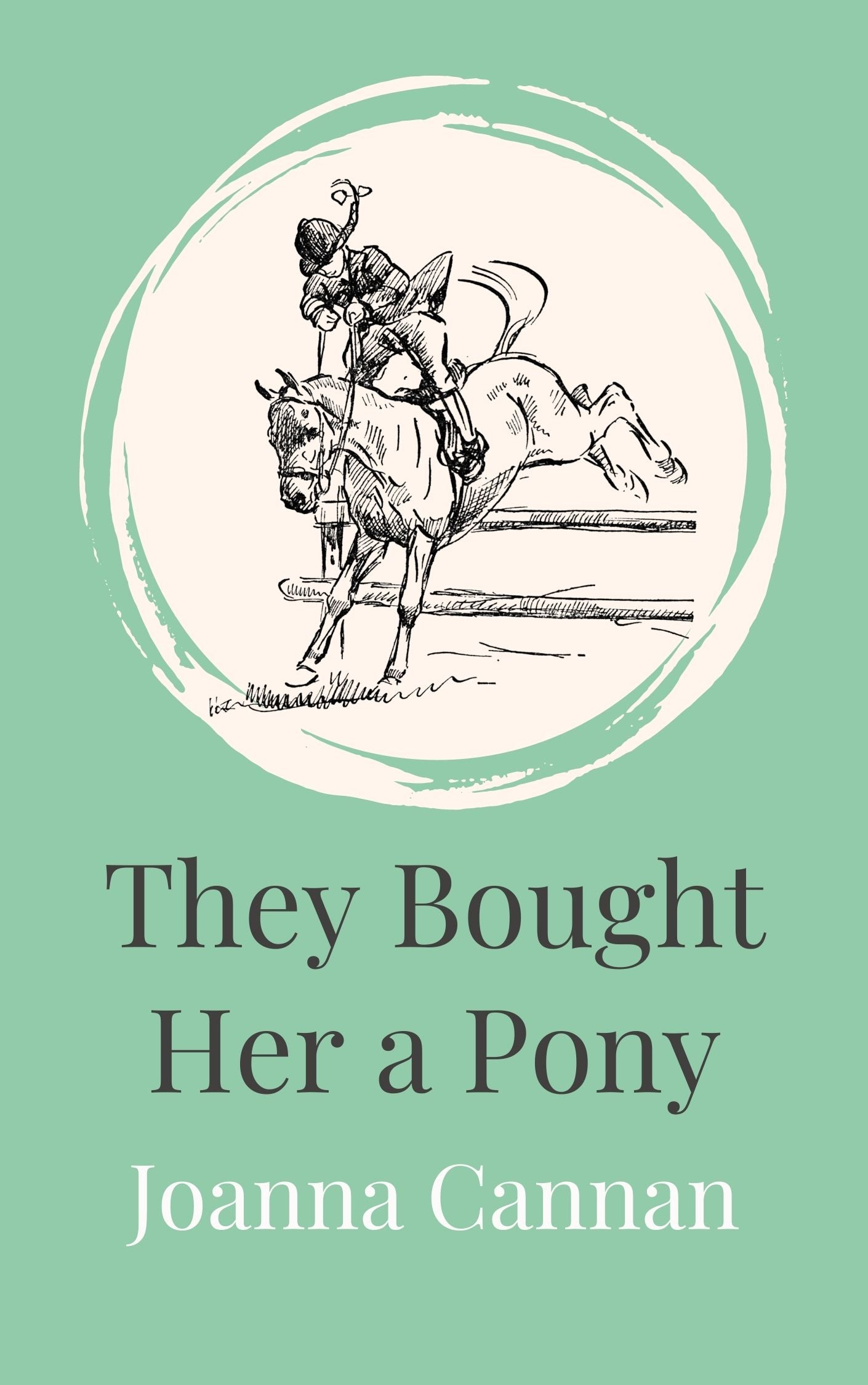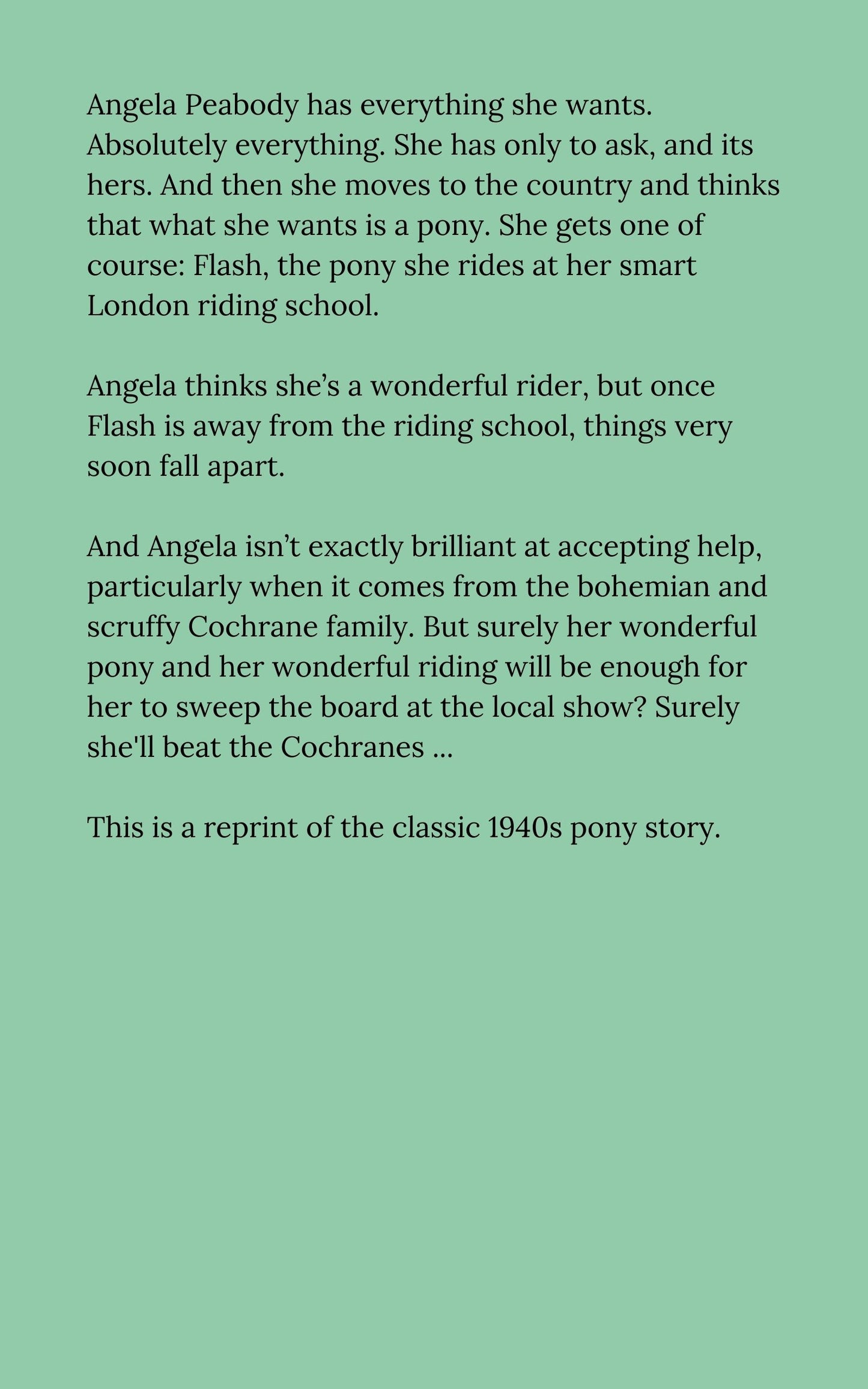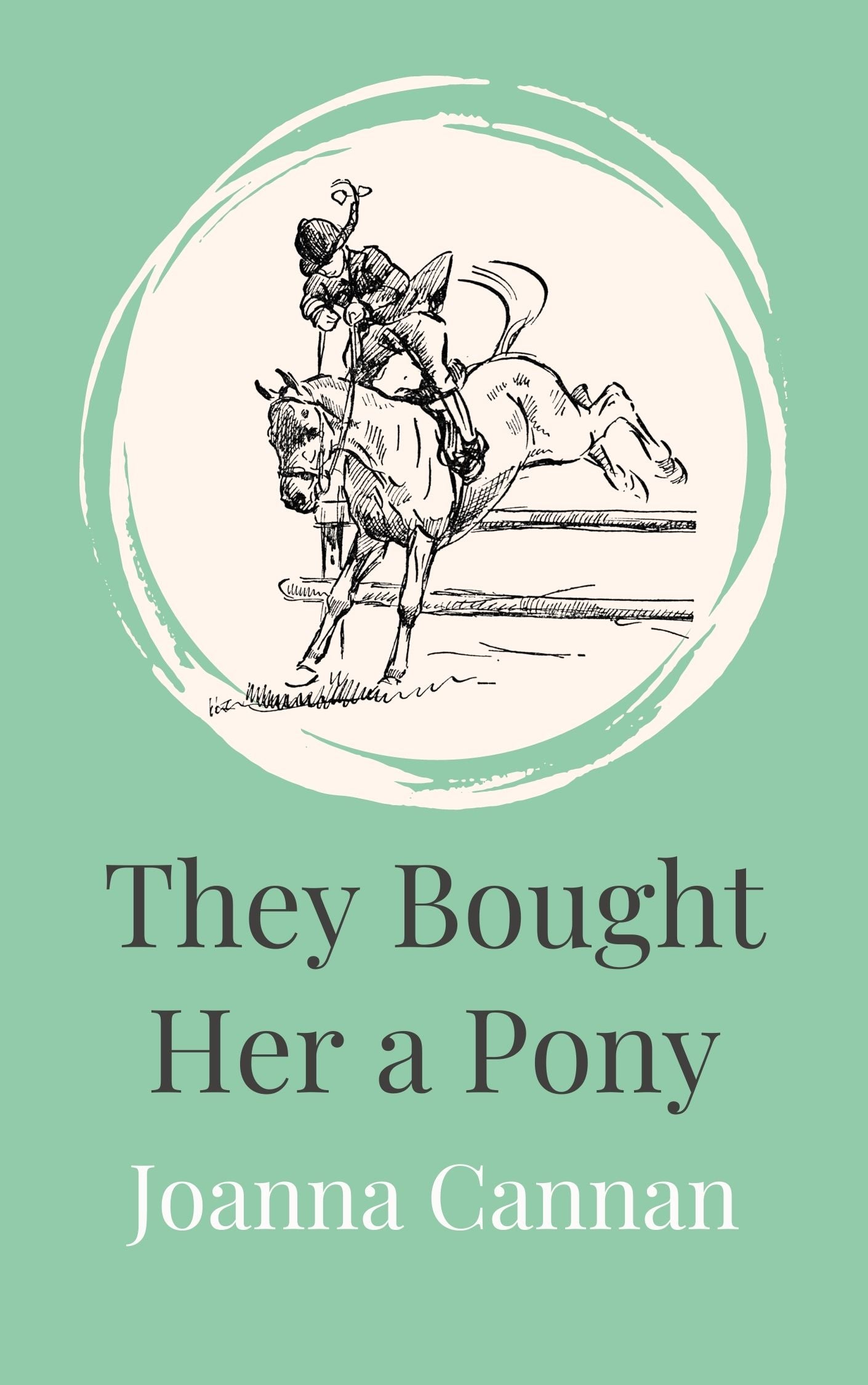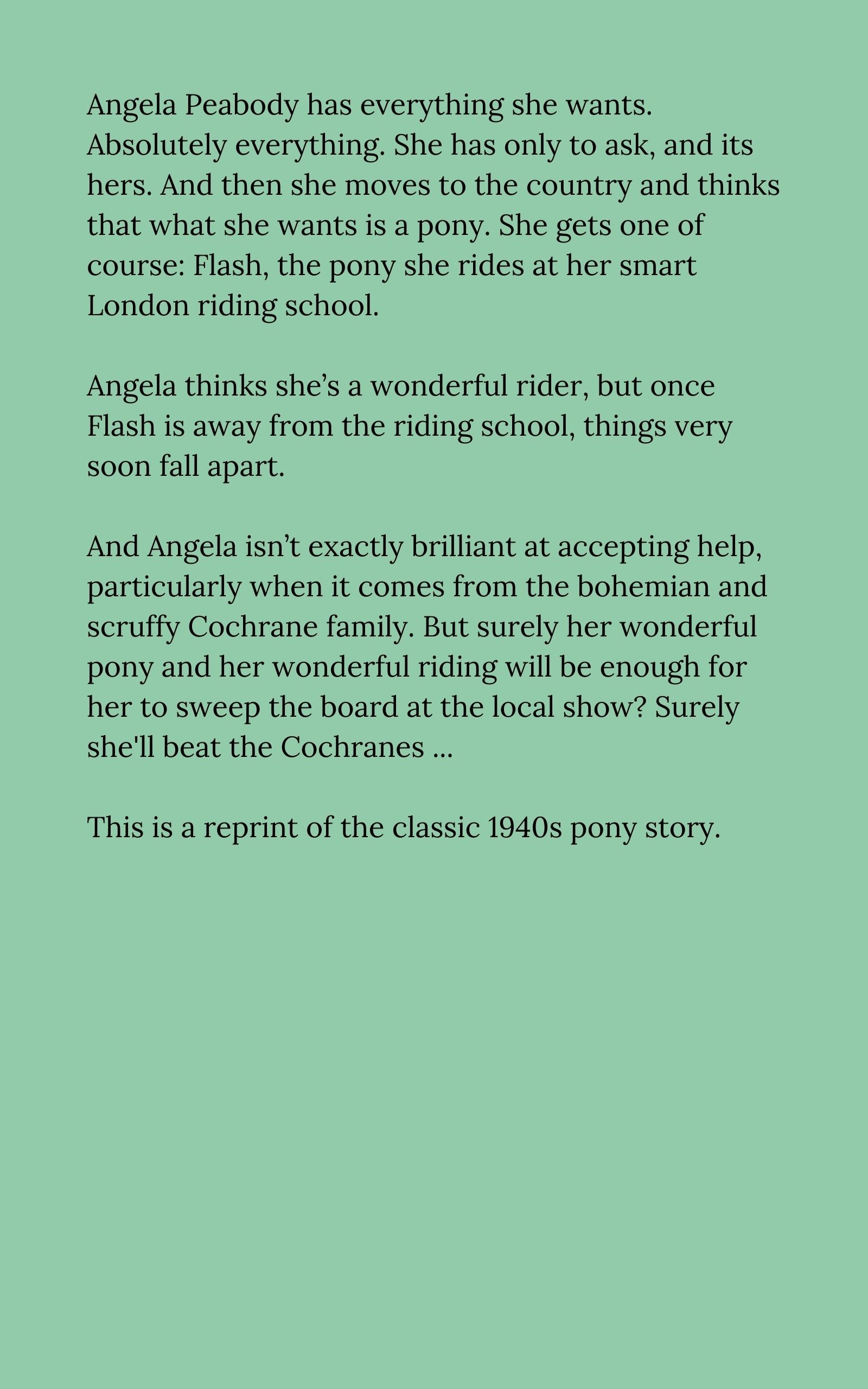Jane Badger Books
Joanna Cannan: They Bought Her a Pony (eBook)
Joanna Cannan: They Bought Her a Pony (eBook)
Couldn't load pickup availability
Share
Angela thinks she’s a wonderful rider, but once Flash is away from the riding school, things very soon fall apart. And Angela isn’t exactly brilliant at accepting help, particularly when it comes from the bohemian and scruffy Cochrane family. But surely her wonderful pony and her wonderful riding will be enough for her to sweep the board at the local show? Surely she'll beat the Cochranes ...
This is a reprint of the classic 1940s pony story.
Page length: 156
Original publication date: 1944
How do I get my book?
How do I get my book?
There's a link to download in your confirmation email. If you need help, the email from Bookfunnel, who handle our delivery, will walk you through downloading the file that works best for you.
How do I read my eBook?
How do I read my eBook?
You can read the ebooks on any ereader (Amazon, Kobo, Nook), your tablet, phone, computer, and/or in the free Bookfunnel app.
Read a sample
Read a sample
ANGELA PEABODY was an only child. Her father was a financier and he was very rich. The Peabodys lived in a large house in London and Angela went to a day school, where she had one great friend, whose name was Pamela Moss.
In the summer holidays the Peabodys went to the seaside, but in the Christmas and the Easter holidays they stayed in London and Angela went to pantomimes and films, and three times a week she and Pamela rode in the Park with Captain Dunne. Pamela was rather nervous and she generally rode a quiet black pony called Jet; but Captain Dunne considered that Angela was his most promising pupil and she rode a showy chestnut, whose name was Flash.
Angela had had riding lessons since she was five years old and she had a very good seat and she wore beautifully made riding clothes. She used to dash along with her golden curls flying behind her and people standing by the rails and watching used to say, “What a frisky little pony!” and, “What a grand little rider!” They didn’t know enough about riding to tell that Flash was over-bending and tossing his head about because Angela’s heavy hands were holding him in so tight that his neck was aching, while at the same time her heels were driving him along.
Of course Captain Dunne should have corrected her, but he was a very stupid man and knew nothing about the theory of riding. He was also very conceited and, having ridden for years, he was quite sure that no one could teach him anything, and if anyone mentioned the forward seat, or anything which had been thought of since he had learned to ride in eighteen hundred and eighty-six, he laughed scornfully and called it new-fangled nonsense.
On days when it was too wet or too frosty to ride in the Park, he taught Angela to jump in his covered school and he made her sit well back and keep her reins tight. Flash scarcely ever refused and Angela scarcely ever took a toss and Captain Dunne said, “That’s fine,” and “That’s grand,” and Pamela, who was too nervous to jump but came to watch, said, “I wish I could ride like you, Angy,” so that, although Angela wasn’t conceited by nature, she could not help thinking that she must be a good horsewoman. She didn’t know, of course, that a few minutes before her lessons a stable boy put Flash over the jumps and Captain Dunne ran behind cracking a whip, so that Flash would be sure not to refuse when Angela rode him. Before she rode him in the Park, he was exercised too; otherwise he would have bucked her off in the first few minutes.
Angela was eleven years old when her parents began to talk of buying a house in the country. Angela asked, “Shall I be able to have a pony of my own?” and her father said, “Of course, my poppet. You shall have the best pony that money can buy and go out hunting and I bet the county people get a surprise when they see you flying over the hedges and ditches.” Mr. Peabody had always lived in towns and did not know one end of a horse from the other, but he had watched Angela jumping round the covered school and Captain Dunne, who always flattered his rich customers, had told him that in fifty years’ experience he had never seen such a grand little horsewoman.
Mrs. Peabody, who was afraid of horses and had only allowed Angela to learn to ride because it was fashionable, said she didn’t know about hunting; she didn’t want any broken limbs or Angela’s beauty spoilt, but of course she could have a pony of her own and a groom to look after it. It did not occur to her that, besides being more fun, it would be good for Angela to look after her own pony. Mrs. Peabody’s father was a button manufacturer and she had always been very rich and even when, as a child in Birmingham, she had kept rabbits, they had always been cleaned out by the second gardener. She thought it would be dreadful to have to do dirty jobs like that yourself, and her own small fat hands were always clean and white and her nails were cut into points and varnished whatever colour happened to be fashionable. The best thing about Mrs. Peabody was that she was kind-hearted and very generous; she gave a great deal of money to hospitals and she loved to give presents to people who were less well off than she was. Unfortunately she was apt to choose purple cushions ornamented with gold squiggles, or pink lampshades with tinsel tassels, or mauve nightdress-cases shot with silver, or biscuit-boxes covered with velvet, so that a great many of her friends kept her presents in cupboards for a bit and then sent them to bazaars and jumble sales.
The Peabodys spent nearly a year house-hunting. On most Saturday afternoons they drove out into the country in their Daimler and they often took Angela. Angela liked some of the houses, especially the ones with good stabling, but her parents were more difficult to please: Mrs. Peabody wanted large lofty rooms, no ghosts or mice and a tea-lawn; Mr. Peabody wanted a well-timbered park, a picture gallery and his money’s worth.
After many disappointments, they got tired of looking at houses, and they used to be rather rude to the people to whom the houses belonged. Mrs. Peabody used to say, “Pokey!” in a loud voice and Mr. Peabody talked about his money’s worth and said, “However can people let their house get into such a terrible state of repair?” Most of the people who were selling their houses were doing so because, owing to the income tax and the state of agriculture, they could not afford to keep them up and they were heartbroken at having to leave their ancestral homes, so the Peabodys’ rude remarks annoyed them and sometimes they answered back and said in scornful tones that money couldn’t buy everything, which surprised Angela, who had always thought it could.
At last Mr. and Mrs Peabody found a house called Langley Park, which had large lofty rooms, no ghosts or mice, a tea-lawn, a picture gallery and a park well-timbered with ancient oaks. It had been built in the time of George IV, and, though the rooms were big, there were not many of them, so Mr. and Mrs. Peabody decided to build some more. They built a billiard-room and a garden-room and a sun-lounge and a cocktail bar and above these rooms they built several bedrooms and bathrooms, and they made some of the bedrooms in the old part of the house into bathrooms, so that there were fifteen bathrooms in all. The new wing of the house was built out at the side of the old part and it looked very red and new and the plate-glass windows of the sun-lounge glittered, and when the Cochrane children, who lived at the Grange, rode along the right of way through the park on their ponies, they said how awful it looked and what frightful people the Peabodys must be.
Angela went several times to Langley with her parents to see how the improvements were getting on. Once she went to choose her bedroom. She chose a room which looked out across a shrubbery to the stables, but her mother said it was a back room and only fit for the butler, and she must have one of the large front rooms. By this time the building was finished and the decorating had begun. It was all designed and arranged by a young man called Sebastian Montfort. He was very artistic, and fashionable people, with no ideas of their own, paid him large sums of money to arrange their rooms. In a patronizing voice he asked Angela what kind of decoration she would like, and she said, “Something with horses on it,” but Sebastian Montfort only smiled pityingly and said that he would create the perfect room for a young girl.
Unfortunately he did not know much about young girls and when Angela’s room was finished and she went to see it, she was bitterly disappointed. It was very empty and it was all white except for the carpet and the few pieces of furniture, which were pale grey, and the one picture, which was a coloured print of pale flowers. Angela’s clothes were to be kept in cupboards, which were built into the walls, so there was no other furniture besides the dressing-table, the bed, a bedside table, and a chair and a small sofa, which were covered in white satin and ornamented with mother-of-pearl buttons, which stuck into Angela when she sat down.
“Now, Angy, dear,” said her mother, “Daddy and I have given you a very beautiful room—that sofa and chair alone cost eighty pounds and the white vase on the mantelpiece was wanted by a museum, only Mr. Montfort outbid them at the sale. So you mustn’t put any trash about the room to spoil it—none of your cheap china ornaments—anyhow, you won’t want them now you’re such a big girl.”
Angela’s heart sank. As she had sat down on the uncomfortable sofa, she had looked round to see where she could put Neddy and Nellie, two little plush donkeys, which she had had for ages, and Sunshine, a chipped china horse, which she had often taken to school in her pocket, and Dusky, a wooden spaniel, which she had persuaded a girl at school to swop for one of her silk handkerchiefs. She wanted places too for a vase, which said, “A present from Rothesay,” and a mug, which said, “Let Glasgow Flourish.” They had been given her by her old nurse and, besides liking the vase and mug, Angela had been very fond of her old nurse and had cried for days when she had left after a final disagreement with Mrs. Peabody.
Angela said, “I do want them,” but Mrs. Peabody said, “Don’t be silly, darling. What would people think if they came into your room and saw a lot of rubbish set out beside that lovely Chinese vase?” Angela had been brought up to believe that what other people might think about you was very important, so she said no more, but decided to keep Neddy and Nellie and Sunshine in one of the built-in cupboards and leave the sliding door open, so that their stable would not be too dark.
Before the Peabodys moved from London, Angela reminded her parents that they had promised to buy her a pony. Mr. Peabody said that he would consult Captain Dunne and Angela said, “I wish I could have Flash, but Captain Dunne says he’ll never part with him at any price.” Mr. Peabody said, “If that’s the pony my poppet wants, she shall have it. I’ll offer Dunne a price that he can’t refuse,” and he went to see Captain Dunne and said, “Now, Dunne, what’ll you take for that pony?” Captain Dunne replied that he didn’t want to sell Flash; he was a showy pony and a safe pony and a good advertisement, besides which, Captain Dunne said, he was fond of the pony. Mr. Peabody said, “That makes it very awkward for me. My little girl has set her heart on that pony,” and he got out his cheque book and said, “Now, Captain, name your price.”
Captain Dunne hesitated for a moment. He had paid twelve pounds for Flash and had had eight years’ work out of him; Mr. Peabody was, he thought, quite foolish enough to pay thirty guineas and that would be a fine profit. On the other hand, it was quite true that Flash was a good advertisement: people who don’t know much about ponies always admire a showy chestnut with a slightly hackney action; but it was not true that Captain Dunne was fond of Flash. Flash was well-mannered because he knew he would be beaten if he wasn’t, but occasionally he decided to risk a beating and kicked Captain Dunne good and hard on his shins; it was also a bit of a nuisance having to have him exercised before a child could ride him. Captain Dunne was just going to say that he couldn’t part with his little pal for less than thirty guineas, when Mr. Peabody said, “Just as a start I’ll suggest fifty pounds.”
Captain Dunne was amazed but delighted. He could buy at least four ponies for fifty pounds. However, he thought that, as Mr. Peabody was so foolish, he might as well get a little more money out of him, so he shook his head, and said that he couldn’t part with his little pal under sixty guineas. Mr. Peabody said, “Right,” and made out a cheque for sixty guineas and arranged for Flash to be sent to Langley Park, where the gardener’s boy was to look after him. Mr. Peabody had meant to engage a groom, but he had consulted one of his City friends, who had roared with laughter at the idea of keeping a groom for one child’s pony and had told him that all children do their own ponies nowadays. Mr. Peabody gave up looking for a groom, but still didn’t like the idea of his poppet brushing mud off a pony, much less mucking out a stable, so he arranged that all that should be done by the gardener’s boy.
At the beginning of the summer the Peabodys’ new home was ready for them, and on the first Saturday in June they stepped into their large Daimler and were driven out of London by Millward, their chauffeur. All their luggage had gone before them and Mrs. Peabody only carried her jewel box and Angela a case fitted with her pale pink enamel dressing-table set, of which she was very proud. Unknown to anyone but herself, inside the case were Neddy, Nellie, Sunshine, Dusky, “A Present from Rothesay” and “Let Glasgow Flourish.” Her mother’s maid, Wilson, had been told to go through her things and turn out all the trash and anything that was in the least bit worn or shabby, but before this was done, Angela had taken the precaution of burying the horse, the spaniel, the donkeys, the vase and the mug in a window-box. They were a bit earthy now, but they were safe.
Who's in the book?
Who's in the book?
Human: Angela Peabody, Mr and Mrs Peabody, The Cochranes (Hugo, Phillipa, Henrietta, Crescy, Marcus and Candy)
Equines: Flash, Stardust, Rocket, Ebony
Other titles published as
Other titles published as
Series order
Series order


I first read this story years ago. I purchased it in a book with two other stories. Since "They Bought Her a Pony" is what I call one of my comfort books, the binding on the book has started to go.
I'm glad Jane Badger offers this book. I managed to miss it on my initial search and emailed about my problem. I did find it later that day. I'm in the USA, so 6 hours behind England. By the next morning I had an answer to my email. What great customer service!
A great read but felt ending was left hanging a bit - not sure if there is a follow on at all?


